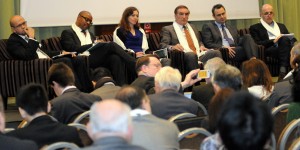WARSAW, POLAND (November 17, 2013)— Today, WEDO’s Eleanor Blomstrom spoke on a panel at COP19 parallel event as part of 2013 Transport Day. The event concluded with the adoption of the “Warsaw Statement on Sustainable, Low Carbon Transport”, with recommendations on how to strengthen the integration of sustainable, low-carbon transport in the UNFCCC process, particularly the new global agreement on climate change. You can download an overview of the events here: http://www.iisd.ca/download/
Below, a summary from IISD on the event Eleanor participated in:
Sustainable Transport- A Key Building Block of Sustainable Low Carbon Development
Heather Allen, Transport Research Laboratory, moderated the session, which addressed the need for holistic planning and partnerships in the transport sector.
Stating that Africa is the most vulnerable continent to climate change, Anthony Okon Nyong, African Development Bank (AfDB), stressed that sustainable transport strategies represent an important focal area for AfDB to promote climate- resilient development.
Norbert Gorissen, German Federal Ministry for the Environment, Nature, Conservation and Nuclear Safety, highlighted two NAMA projects in the transport sector, including one focused on transport-orientated development in Columbia and a fund to facilitate small transport-related interventions in Indonesia.
Presenting rail as part of a larger transport scheme, Jean Pierre Loubinoux, International Railway Association, introduced a report produced in cooperation with the International Energy Agency (IEA) entitled “RailwayHandbook 2013: Energy Consumption and CO2 Emissions.” He highlighted the need for stakeholder collaboration and policy tools to support informed decision making.
Danang Parikesit, Indonesia Transportation Society, stated that the UN Climate Change Conference in Bali (COP 13) served as a “wake-up call,” identifying the link between climate change, economic development and transportation. He highlighted the benefit of the NAMA facility and stressed two components to move sustainable transport forward, namely ambitious leadership and collaboration across ministries, especially ministries of finance.
Holger Dalkmann, EMBARQ – the World Resources Institute (WRI) Center for Sustainable Transport, identified finding co-benefits, such as linking the Green Climate Fund’s (GCF) commitments to MDBs to leverage additional resources. He acknowledged the need for sectoral discussions regarding financial commitments and raising investment in sustainable transport.
Noting that transport infrastructure, planning and policies are often male-dominated, Eleanor Blomstrom, Women’s Environment & Development Organization, identified the need to provide sustainable, safe, healthy and affordable transport alternatives suitable for women. She called for a holistic approach, and stressed that transport policies should address equity and inclusiveness.
The ensuing discussion addressed, inter alia: integrative transport policies that address mitigation, adaptation and sustainable development; transport within the Post-2015 Development Agenda; capacity building and institutional support; information dissemination to inform civil society and decision makers; NAMAs in the transport sector; stakeholder participation; and behavior change.



